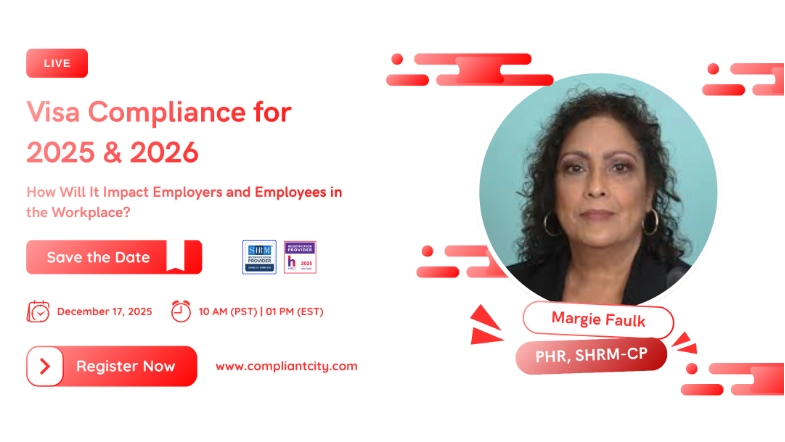Visa Compliance for 2025 2026 How Will It Impact Employers and Employees in the Workplace
The breakneck speed with which the new Trump administration has implemented changes to the nation’s immigration policy and various federal government agencies has certainly caused confusion for many employers. No industry has been immune to those impacts, but the high-tech sector, which has long been reliant on foreign professional skilled workers, is particularly impacted. How will these changes affect the high-tech sector’s future?
What are Workplace Visas H-2B Visa Program:
The H-2B visa program allows U.S. employers to temporarily employ nonimmigrant workers in non-agricultural jobs.
Using the first Trump administration as the measuring stick, we can expect the following developments to unfold for the remainder of 2025 and beyond:
Increased Inspections of H-1B Worksites
The news has given extensive attention to the federal government’s increased ICE (Immigration and Customs Enforcement) raids to gather and deport undocumented workers, and we’ve also seen an uptick in audits of Form I-9s. The hi-tech sector rarely faces these kinds of issues since their workforce is mainly composed of highly skilled professionals within engineering, finance, and white-collar management.
Workplace Visas
The H-1B is the most common type of employment sponsorship leveraged within the hi-tech industry. Many hi-tech companies from large, publicly traded organizations to small start-ups hire H-1B workers. A majority of the H-1B sponsored workers are some of high-tech’s most critical engineers. With the U.S. adding 85,000 new H-1B employees to the workforce every year, there is no doubt this has been a valuable resource for high-tech employers that cannot find enough qualified U.S. workers to fulfill these roles.
F-1 and J-1 Student Visa:
The most common visa for international students, requires proof of admission, financial stability, and intent to go back home after graduation. These student visa rules are subject to change under different administrations, impacting the eligibility and application process for international students.
Recent statements by Trump advisors Elon Musk and Vivek Ramaswamy, along with President Donald Trump himself, suggest the second Trump Administration may take a more favorable stance on H-1B visas compared to the “America First” approach of the past. This was initiated when Musk and Ramaswamy provided this flexibility option because they used the Visa program to gain citizenship.
Why should you attend:
The current administration A new proclamation also added a significant $100,000 fee to certain H-1B employers starting.
In response to the new $100,000 fee for H-1B visas, companies initially scrambled to issue urgent guidance to employees and determine the policy’s scope amidst significant confusion.
The Proclamation blames H-1B visa holders and unscrupulous employers for alleged exploitation of the H-1B program.
Foreign Student Visa Limits: The Department of Homeland Security (DHS) proposed a rule to limit the time certain visa holders, including foreign students, can remain in the U.S. without further screening to address potential visa abuse and safety risks
The Gold Card is a new immigration pathway created by a presidential executive order on September 19, 2025. Compliance depends on whether the applicant is an individual or a corporation.
Areas that will be covered during the Session
- Learn what workplace restrictions are impacting Employers who count on Foreign workers to be competitive when it comes to technology, science, math, and engineering
- Learn why some workers are critical of the Foreign workers’ sponsorship programs
- Learn where the Birthright Citizenship Executive Order is being mitigated legally
- Learn how the Visa process has impacted the workplace
- Learn how workplace Visas are being changed or modified to only include advanced degrees to be selected
- Learn which new updates will be in place in 2025 and 2026
- Learn how Workplace Visas manages the lottery process to select eligible and qualified workers
- Learn what the benefits are for Visa recipients
- Learn how the lottery system has changed for 2025
- Learn what the CAP program is and why it was terminated
- Learn what Deferred Action for Childhood Arrivals (DACA) has been impacted by and what the status is
- Learn how the Temporary Protected Status has now been terminated
- Learn how Employers who have refugee workers have to accommodate the loss of these workers
- Learn how to keep up to date on the Immigration guidelines that can impact Employers and employees
Who should attend?
- All Employers
- Business Owners
- Company Leadership
- Compliance professionals
- HR Professionals
- Managers/Supervisors
After the live event, there will be a Q&A session where you can ask a question directly to our expert speaker. They will provide a clear and understandable response to help you better understand the topic.
Note: After completing your webinar purchase, please check your spam/junk folder in your email for the webinar joining link, which will be sent after the confirmation email.
A complete overview of upcoming U.S. visa policy changes for 2025–2026, covering H-1B, H-2B, F-1, J-1, DACA, TPS updates, increased audits, compliance risks, and employer action steps to stay fully compliant in the workplace.
This session explains the upcoming visa and immigration compliance changes for 2025–2026, including updates to H-1B, H-2B, F-1, J-1, DACA, and TPS programs, and how these changes will impact employers, HR teams, and employees.
HR professionals, compliance officers, employers, business owners, and anyone responsible for managing employee work authorization, visa sponsorship, or workplace compliance.
Yes. If you purchase the recorded version, you will receive the full session recording along with access to the webinar materials.
Yes. Attendees receive free compliance tools, including checklists, templates, and practical guides to help implement updated visa and workplace compliance procedures.
Yes, the webinar offers 1.5 PDCs (SHRM) and 1.5 CEUs (HRCI) upon completion.
This session provides a comprehensive breakdown of the upcoming visa policy changes for 2025–2026 and how they will impact both employers and employees in the workplace.
Attendees will gain clarity on newly proposed immigration rules, increased worksite inspections, updates to the H-1B program, evolving compliance requirements, and the shifting responsibilities of HR teams and business owners.
Topics Covered Include:
- Major changes to U.S. visa programs, including H-1B, H-2B, F-1, J-1, TPS, and DACA.
- New employer compliance obligations and documentation standards for 2025–2026.
- Increased government audits, Form I-9 inspections, and enforcement actions.
- Policy updates affecting sponsorship, renewals, wage rules, and work authorization.
- What employers must do now to prepare for rapidly changing immigration requirements.
- Best practices for HR teams to stay compliant and avoid penalties.
- Tools and actionable checklists to strengthen your organization’s visa compliance process.
This section helps participants stay informed, proactive, and fully compliant as immigration laws and workplace requirements continue to evolve.



 Alert
Alert